-

新人教版高中英语必修2Unit 4 History and Traditions-Discovering Useful Structure教案二
This teaching period mainly deals with grammar: The past participle is used as attributive and objective complement.1. Guide students to review the basic usages of the past participle used as attributive and objective complement.2. Lead students to learn to use some special cases concerning the past participle used as attributive and objective complement flexibly.3. Strengthen students’ great interest in grammar learning.1. Help students to appreciate the function of the past participle used as attributive and objective complement.2. Instruct students to write essays using the past participle used as attributive and objective complement.Step1:温故而知新。Analyze the underlined phrases and then sum up the common usages of the past participles.1.(教材P41)They had castles built(build) all around England, and made changes to the legal system.2.(教材P42)They use the same flag, known(know) as the Union Jack,...3.(教材P42)Judy and I had our car parked(park) in an underground car park near Trafalgar Square, where we could get our car battery charged(charge).Common points: f the past participle used as attributive and objective complement.Step 2:过去分词作定语时的意义1.及物动词的过去分词作定语,在语态上表示被动;在时间上,常表示动作已经发生或完成,有时也不表示时间性。Our teacher watched us doing the experiment and gave us a satisfied smile at last.我们的老师看着我们做实验,最后给了我们一个满意的微笑。The plan put forward at the meeting will be carried out soon.会上提出的计划将很快被执行。2.不及物动词的过去分词作定语,它不表示被动意义,只强调动作完成。Many little kids like gathering fallen leaves in the yard.

新人教版高中英语必修2Unit 4 History and Traditions-Reading and Thinking教案二
Step 5 While reading---Task 3Read the text again and answer the following questions.Q1: How many countries does the UK consist of ?4 Q2: What are the four countries of the United Kingdom?England, Wales, Scotland and Northern Ireland Q3: Which two were the first to be joined together ?England and WalesQ4: What are the two chief advantages of studying the history of a country ?The first one is to help you understand more about the country and its traditions.The second one is to make visiting it more enjoyable.Q5: What’s the author’s attitude towards studying the history ?Supportive/positiveStep 6 Post reading---Retell the textThe United Kingdom, Great Britain, Britain, England—many people are confused by (1)_____ these different names mean. In the 16th century, the nearby country of Wales (2) __________(join) to the Kingdom of England. In the 19 th century, the Kingdom of Ireland was added to create the United Kingdom of Great Britain and Ireland. Finally, the southern part of Ireland (3) ______ (break) away from the UK, which resulted in the full name we have today. However, most people just use the (4)_________(shorten) name: the UK. The four countries (5)__________ belong to the United Kingdom work together in some areas. There were four sets of invaders and the last group were the Normans. They had castles (6)_________(build) all around England and made changes (7)__________ the legal system. Studying the history of the country will make your visit much more (8)_________(enjoy). The capital city London is (9)___ ancient port city that has a history (10)______(date) back to Roman times. 1. what 2.was joined 3.broke 4.shortened 5.that 6. built 7.to 8.enjoyable 9.an 10.dating Step 6 Homework

新人教版高中英语必修2Unit 4 History and Traditions-Reading and Thinking教案一
Features of languages1.Finally, in the 20th century, the southern part of Ireland broke away from the UK, which resulted in the full name we have today: the United Kingdom of Great Britain and Northern Ireland.该句是一个复合句。该句主句为:the southern part of Ireland broke away from the UK;which resulted in the full name we have today为which引导的定语从句代指前面整句话的内容,we have today为定语从句修饰先行词name。译文:最后,在20世纪,爱尔兰南部脱离英国,这导致了我们今天有的英国的全名:大不列颠及北爱尔兰联合王国。2.Almost everywhere you go in the UK, you will be surrounded by evidence of four different groups of people who took over at different times throughout history.该句是一个复合句。该句主句为:you will be surrounded by evidence of four different groups of people;其中Almost everywhere you go in the UK为让步状语从句; who took over at different times throughout history为定语从句修饰先行词people。译文:几乎无论你走到英国的任何地方,你都会发现历史上有四种不同的人在不同的时期统治过英国。3.The capital city London is a great place to start, as it is an ancient port city that has a history dating all the way back to Roman times.该句是一个复合句。该句主句为:The capital city London is a great place to start; as it is an ancient port city that has a history dating all the way back to Roman times.为原因状语从句;dating all the way back to Roman times为现在分词短语作定语修饰history。

新人教版高中英语必修2Unit 4 History and traditions教案
这个地区有着深厚的传统。既学既练:为了让更多的外国游客了解中国文化,欣赏中国美丽的自然风光,感受中国发生的巨大变化,某外文杂志社将出版一本英语小册子来介绍中国的旅游景点。该杂志社邀请你为该小册子写一篇英语短文来介绍杭州,内容包括:1.杭州的位置(中国东南部)、面积(16 000多平方公里)及历史(2 200多年)等;2.杭州的旅游特色(自然风景、传统文化、特色小吃等);3.希望更多的游客来杭州参观。注意:1.词数80左右;2.可适当增加细节,以使行文连贯。Located in the southeast of China, Hangzhou is a beautiful city.Dating back more than 2,200 years, Hangzhou covers an area of more than 16,000 square kilometers.In Hangzhou, you can visit the West Lake, whose scenery is fascinating.In addition, you can’t miss its cultural relics and historical sites, from which you will learn more about excellent Chinese traditional culture and traditions.In Hangzhou, the special snacks are famous and visitors from different parts of the world think highly of them.As a tourist attraction, Hangzhou attracts a large number of visitors from home and abroad every year.Once you come to China, Hangzhou is a scenic spot you can’t miss.

新人教版高中英语必修2Unit 5 Music-Discovering Useful Structures教案二
4. When he got absorbed in his world of music, he felt as if he could “see” the beauty of the world around him, like he had in his previous life.P·P as adverbial: _________________________________________________________________.Function: _______________________________________________________________________.Step 5 Solid Complete the passage with the words in brackets in their correct forms.Well known as a successful band, the Impact members show quite a few striking qualities. They never ever give up. When _____________(question) by the media, they are not _____________(discourage) and practise even harder. They are improving themselves by attending several master training class. They are united. _____________(fill with) team spirit, they act as a whole, always aiming for glory. Step 6 Difference and similarity from -ingObserve the following examples.1. He went out, shutting the door behind him.=He went out, ________________________________________________________.2. Not knowing what to do, he went to his parents for help.=__________________________________________, he went to his parents for help.Similarity: _______________________________________________________________________________________________________________________________________________________.Difference : _______________________________________________________________________________________________________________________________________________________.Step Practice1. ________ in a hurry, this article was not so good. 因为写得匆忙, 这篇文章不是很好。2. ________ carefully, he found something he hadn’t known before. 他仔细读书时, 发现了一些从前不知道的东西。3. ________ why he did it, the monitor said it was his duty. 当被问及他为什么要这么做时, 班长说这是他的职责

新人教版高中英语必修2Unit 5 Music-Listening&Speaking&Talking教案
choir memberspeople to run food stands people to sell festival ticketspeople to sell music CDspeople to set up equipmentmusical performersStep 2: Listen to the announcement again and answer the questions. ? 1. What kind of songs will Grace Davis sing at the festival?? 2. Who can try out as a performer?? 3. What can those who think they do not have musical talent do?? 4. How can students volunteer to take part?? Talking about preferences:? Would you prefer doing ..?? What would you prefer to do?? Would you rather do .... or ….?? What would you rather do?? I'd prefer .... to ..? I'd rather have ... than .. Step 3: Speaking ProjectWork in groups. Role-play the conversation or make a new one.? Debbie: Where have you been? You missed the announcement about the music festival.? John: I was at the doctor's office. Music festival?? Frank: Yes, it's going to be next month on the school sports field. John, you can play the piano. How about playing it at the festival?? John: Well, I'd rather play the violin. I can play Liang Zhu.? Frank: Wow! Sounds good. What about you, Debbie? ? Debbie: Actually, I don't have much musical ability. I'd prefer just to help out with the crowds.? Frank: You can sell tickets or work at a food stand.? John: So can I assume that the aim of the festival is to raise money?? Debbie: Yes. All of the money will go to charity.

新人教版高中英语必修2Unit 2 Wildlife Protection-Discovering Useful Structure教案一
The activity topic of this section is "report an ongoing event", and the structure is the passive voice of present continuous tense. Rare wild animals are suffering from large-scale poaching, and species are on the brink of danger. Rescue operations are underway. "Being" and "suffering" are the meanings of the present progressive passive voice.The usage of present progressive passive voice is of great importance in writing a good discourse and appreciating some difficult language items, so it is vital to master it and use it flexibly in a context.1. Motivate Ss to deepen the understanding of the usage of present progressive passive voice in a fixed context.2. Enable Ss to master the usage of present progressive passive voice and use it flexibly in a context.3. Lead Ss to construct sentences or appreciate sentences used master it and use it flexibly in a context.1. Help students to appreciate the function of the usage of present progressive passive voice in a sentence2. Instruct students to write essays using the proper usage of present progressive passive voice.Look at the picture and tell me what are workers doing? What is the house being done?

新人教版高中英语必修2Unit 4 History and Traditions-Listening&Speaking&Talking教案二
Listening and Speaking introduces the topic of “Take part in a youth project”. The listening text is an interview about "sharing views on historical sites". Through listening to a dialogue between Chinese and foreign students on the way to the Confucius Temple, students can understand their views on the Confucius Temple, Confucius, Confucius' descendants and Confucius' educational thoughts, so as to realize and think about the profound influence of Confucius and his thoughts on Chinese historical tradition. At the same time, the dialogue naturally integrates English idioms and mentions Shakespeare, the British playwright, so as to provide language materials and context for students to understand English idioms and related cultural allusions, as well as to compare Chinese and foreign cultures, which is helpful for students to understand and express the language such as history, tradition, culture and custom significant impact.Text analysis: listening text is a dialogue between a British student and a Chinese student when he goes to the Confucius Temple. When William, a British student, visited the Confucius Temple, he asked Xiao Kong, a Chinese student, for directions. Xiao Kong was just going to the Confucius Temple to meet with the members of the research group, so they went together and exchanged their views on the Confucius Temple, Confucius, Confucius' descendants and Confucius' educational thoughts. From the perspective of foreign tourists, this paper describes their thoughts on Confucius, the great son of Confucius, who had a profound impact on Chinese history and cultural tradition, and his education.Listening and Talking introduces a visit to a historic tourist destination. Tourism is a common way to understand a country's history, culture, and customs and so on. Students listen to the dialogue between Xiao Yan, a youth hostel Usher, and Paul, a backpacker, to learn about Pingyao's famous historical and cultural attractions and Paul's travel experience and experience as a foreign tourist.

新人教版高中英语必修2Unit 5 Music-Discovering Useful Structures教案一
Step1:自主探究。1.(教材P52)Born(bear) in the USA on 2 January 1970, Whitacre began studying music at the University of Nevada in 1988.2.(教材P52) Moved(move) by this music, he said, “It was like seeing color for the first time.”3.(教材P56)I was very afraid and I felt so alone and discouraged(discourage).4.(教材P58)Encouraged(encourage) by this first performance and the positive reaction of the audience, I have continued to play the piano and enjoy it more every day.Step2:语法要点精析。用法1:过去分词作表语1).过去分词可放在连系动词be, get, feel, remain, seem, look, become等之后作表语,表示主语所处的状态Tom was astonished to see a snake moving across the floor.汤姆很惊讶地看到一条蛇正爬过地板。Finally the baby felt tired of playing with those toys.终于婴儿厌倦了玩那些玩具。注意:1).过去分词作表语时与被动语态的区别过去分词作表语时,强调主语所处的状态;而动词的被动语态表示主语是动作的承受者,强调动作。The library is now closed.(状态)图书馆现在关闭了。The cup was broken by my little sister yesterday.(动作)昨天我妹妹把杯子打碎了。2)感觉类及物动词的现在分词与过去分词作表语的区别过去分词作表语多表示人自身的感受或事物自身的状态,常译作“感到……的”;现在分词多表示事物具有的特性,常译作“令人……的”。
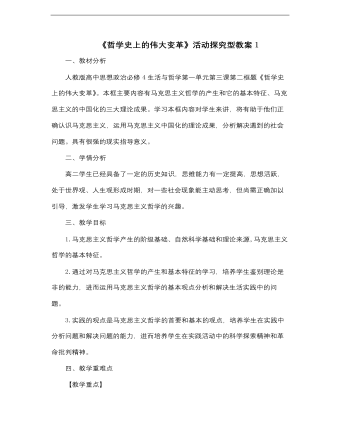
高中思想政治人教版必修四《哲学史上的伟大变革活动探究型》教案
一、教材分析人教版高中思想政治必修4生活与哲学第一单元第三课第二框题《哲学史上的伟大变革》。本框主要内容有马克思主义哲学的产生和它的基本特征、马克思主义的中国化的三大理论成果。学习本框内容对学生来讲,将有助于他们正确认识马克思主义,运用马克思主义中国化的理论成果,分析解决遇到的社会问题。具有很强的现实指导意义。二、学情分析高二学生已经具备了一定的历史知识,思维能力有一定提高,思想活跃,处于世界观、人生观形成时期,对一些社会现象能主动思考,但尚需正确加以引导,激发学生学习马克思主义哲学的兴趣。三、教学目标1.马克思主义哲学产生的阶级基础、自然科学基础和理论来源,马克思主义哲学的基本特征。2.通过对马克思主义哲学的产生和基本特征的学习,培养学生鉴别理论是非的能力,进而运用马克思主义哲学的基本观点分析和解决生活实践中的问题。3.实践的观点是马克思主义哲学的首要和基本的观点,培养学生在实践中分析问题和解决问题的能力,进而培养学生在实践活动中的科学探索精神和革命批判精神。
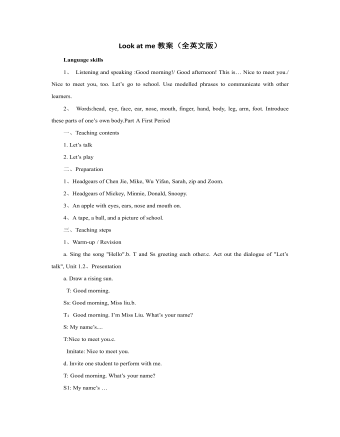
人教版新课标PEP小学英语三年级上册Look at me教案(全英文版)
3、Practicea. Nice to meet you. Nice to meet you,too.b. Perform the dialogue.c. Arrange the dialogue according to the pictures or sentence cards.d. Let’s play.A: Good afternoon,B. This is C. Hello, C! Nice to meet you.C: Nice to meet you, too.A,B: Goodbye!C: Bye!4、Assessment Workbook page 10Add-activitiesa. Listen to the recording and repeat.b. Make a dialogue according to "Let’s talk".Second Period一、Teaching contents1. Let’s learn Words:body, leg, arm, hand, finger, foot.1. Let’s do二、Preparation1、a puppet2、Cards of body, leg, arm, hand, finger and foot.3、headgear of a captain三、Teaching steps1、Warm-up/ Revisiona. Captain says to review "let’s do" of Part A.b. Perform the students their own dialogues.2、Presentationa. Learn to say "body, leg, arm, hand, finger and foot."b. Listen to the recording and repeat.c. Let’s do. Clap your hands. Snap your fingers. Wave your arms. Cross your legs. Shake your body. Stamp your foot.3、Practicea. Let’s draw a person.b. Let’s do. Point out which picture.c. Let’s do. Who responses faster.4、Assessment Workbook page 115、Add-activitiesa. Listen to the recording, repeat and act out.b. Say all the names of the body to your parents.Third Period一、Teaching contents1. Let’s check2. Let’s chant二、Preparation1、stationeries1、pictures of parts of Zoom

人教版高中语文必修3《过秦论》教案
二、文本解读方法点拨研读课文第三、第四段。要求:师范读,生轻声跟读,然后生齐读。方法:第三段秦统一天下前,应用较强的语势读出,充分渲染塑造一个“威加海内”的帝王形象。统一天下之后,秦王朝至此已达顶峰,这意味着从此转入守势。这段文字义正词严,充分揭露了秦的暴虐无道,故诵读应有“声讨”之势。末句“天下已定”总承以上内容,其后应有较长停顿,然后转入叙秦始皇的心态,用以反衬下文灭亡之速,读时须有嘲讽意,突出“自以为”“万世之业”等词语。第四段起首“始皇既没,余威震于殊俗”两句,暗示民心不服,人人自危,宜用从容、沉着的语调读出。“然陈涉瓮牖绳枢之子……”急转直下,稍作停顿,以下先抑(“陈涉”至“之富”)后扬(“蹑足”至段末)宜读出对比情调。末句叙事结束全篇,要读得沉着、有力。三、信息筛选学生自译课文(一)学生参照文下注释,口译第三、四段,遇有疑难则作好相应标记,为讨论做好准备。
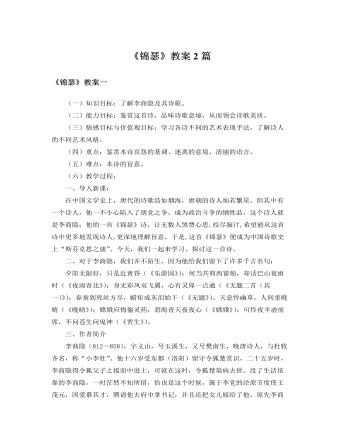
人教版高中语文必修3《锦瑟》教案2篇
【参考】“沧海月明珠有泪,蓝田日暖玉生烟。”沧海中的珍珠只有在明月之夜,才能流下晶莹的泪花;蓝田下的美玉只有在日暖之时,才能升腾飘逸的烟霞。物犹如此,人当如是。“沧海月明”与“蓝田日暖”优美意境的创设,不仅仅是诗人精妙绝伦艺术素养的表现和挥洒,更是诗人回答人生价值的标准和尺度。诗人以物推人,拓展深化了诗作的主题,整篇的闪光点在此,魂亦在此。【参考】“此情可待成追忆,只是当时已惘然。”追忆过去,尽管自己以一颗浸满血泪的真诚之心,付出巨大的努力,去追求美好的人生理想,可“五十弦”如玉的岁月、如珠的年华,值得珍惜之时却等闲而过;面对现实:恋人生离、爱妻死别、盛年已逝、抱负难展、功业未建……,幡醒悟之日已风光不再。如泣如诉的悲剧式结问,又让诗人重新回到对“人生价值到底是什么?到底该怎样实现?”深深的思考和迷惑之中,大大增强了诗作的震撼力。
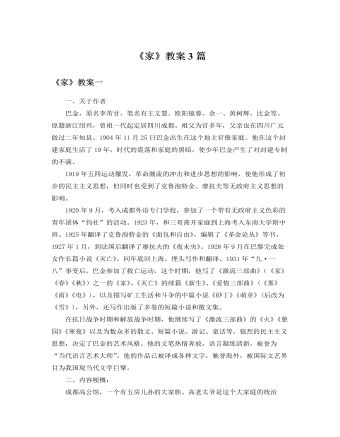
人教版高中语文必修2《家》教案3篇
(幻灯六)巴金作品《家》描写的是“五四”之后,成都地区一个封建大家庭走向崩溃的故事。故事集中在1920年冬到1921年秋的八九个月时间里。成都的一个官僚地主家庭高公馆,一家之主的高老太爷,封建专制,顽固不化。长房长孙觉新,为人厚道,却很软弱,原与梅表姐相爱,后屈从于老太爷之命而与李瑞珏结婚。后来梅和瑞珏双双惨死。觉新的胞弟觉民、觉慧积极参加爱国运动,从而和冯公馆的冯乐山成了死对头。觉民爱上琴,冯乐山却要他娶自己的侄孙女,在觉民觉慧的反抗下,他们终于取得胜利。觉慧爱上聪明伶俐的婢女鸣凤,但冯乐山却指名要娶鸣凤为妾,鸣凤坚决不从,投湖自尽…至此,觉新有所觉醒,而觉慧则毅然脱离家庭,投身革命。(故事主要以高家三兄弟的爱情遭际为线索。)

人教版高中语文必修3《林黛玉进贾府》教案2篇
2、黛玉进入贾府到贾母处,她看到了什么?提示:从荣府西角门进去,走“一射之地”,转至垂花门,过穿堂,绕插屏,再经三间过厅,后面方是贾母居住的正房大院。“正面五间上房,皆雕梁画栋,两边穿山游廊厢房,挂着各色鹦鹉、画眉等鸟雀。”这样穿堂过厅一路行来,仆役、婆子、丫环轮番更换,的确给人以侯门深似海的感觉。然而贾母居处还不是正内室。3、黛玉去拜见二舅舅时又看到什么?提示:往东。“穿过一个东西的穿堂,向南大厅之后,仪门内大院落,上面五间大正房,两边厢房鹿顶耳房钻山,四通八达,轩昂壮丽”。堂屋中迎面“一个赤金九龙青地大匾,匾上写着斗大的三个大字,是‘荣禧堂’,后有一行小字:‘某年月日,书赐荣国公贾源’,又有‘万几宸翰之宝’。”屋内摆设有名贵的家具,珍贵的字画、古玩。“又有一副对联,乃乌木联牌,镶着錾银的字迹,道是:座上珠讥昭日月,堂前黼黻焕烟霞。”由堂屋进入东耳房,这里是起居室,另有一番布置,再到东廊三间小正房王夫人的住室,又别有摆设。

新人教版高中英语必修1Unit 1 Teenage Life-Listening and Speaking & Listening and Talking教案
Step 2 Listening and Talking1. The teacher is advised to talk with their new students about the related topic: Boys and girls, do you know some structures to talk about future activities? Talking about future activitiesWe’ll …I plan to …There’ll be …I hope to …We’re going to …2. After their small talk, the teacher can move on by playing the listening and solve the following task.Underline the expressions in the sentences below Cao Jing and Max use to talk about the future.We’ll learn useful skills.I plan to improve my spoken English.There’ll be students from different schools.I hope to make new friends.We’ll talk about teenage life.I’ll learn to make a fire.There’ll be students from different countries at the camp.There’ll be some experts there to show us how to live in the wild.We’re going to learn about wildlife.I’m going to give a speech.I think I’m going to enjoy the activities.I think we’ll have a lot of fun.3. Work in groups. Plan a youth camp.Teacher make the Ss think of ideas for the camp. And they can use the questions below to get started. And have the Ss present their ideas for a youth camp to the class.●What kind of camp is it?●Who will be there?●What will they do?●What will they learn?

新人教版高中英语必修1Unit 2 Travelling Around-Listening and Speaking & Listening and Talking教案
【教学目标与核心素养】1. Instruct students to get main facts by listening and motivate them to talk about the topics about how to prepare for the trip and make reservations by listening and ultimately can make travel arrangements and reservations. 2. Develop students’ sense of cooperative learning and individual thinking capability. 3. Develop students’ different listening skills to solve different listening comprehensive problems.4. Help students to understand how to use the structures “the present continuous tense (be doing) is used to express future plans.【教学重难点】1. Teach students how to focus on key words, not on single words or grammar.2. Prompt Ss to talk about the related topics, such as how to prepare for the trip and make a travel plan.【教学过程】Step 1: Listening and SpeakingLead inThe teacher is advised to talk with their students about the places that they want to travel most both at home and abroad: boys and girls, if you have a chance to travel around the world, where will you go? After their small talk, the teacher can move on by finishing the following listening task:Before travelling, what do we need to prepare for the trip?
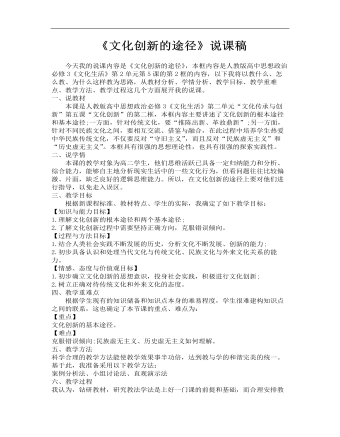
高中思想政治人教版必修三《文化创新的途径》说课稿
二、说学情本课的教学对象为高二学生,他们思维活跃已具备一定归纳能力和分析、综合能力,能够自主地分析现实生活中的一些文化行为,但看问题往往比较偏激、片面,缺乏良好的逻辑思维能力。所以,在文化创新的途径上要对他们进行指导,以免走入误区。三、教学目标根据新课程标准、教材特点、学生的实际,我确定了如下教学目标:【知识与能力目标】1.理解文化创新的根本途径和两个基本途径;2.了解文化创新过程中需要坚持正确方向,克服错误倾向。
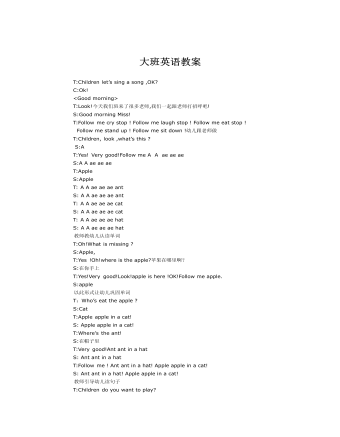
英语公开课教案
<Good morning> T:Look!今天我们班来了很多老师,我们一起跟老师打招呼吧! S:Goodmorning Miss! T:Follow mecry stop ! Follow me laugh stop ! Follow me eat stop ! Follow me stand up ! Follow me sit down !幼儿跟老师做 T:Children,look ,what’s this ? S:A T:Yes! Verygood!Follow me A A ae ae ae S:A A ae aeae T:Apple S:Apple T: A A ae aeae ant S: A A ae aeae ant T: A A ae aeae cat S: A A ae aeae cat T: A A ae aeae hat S: A A ae aeae hat

人教版高中语文必修1《雨巷》教案
(三)作家介绍,写作背景大家说“雨巷”这首诗写得美不美?(美)刚才我也说了,这首诗是中国朦胧诗的百年经典。那么对于这么出名的诗,有谁能够向我们介绍一下它的作者跟写作背景呢?(明确:戴望舒,原名戴朝实又名戴梦鸥,1905年出生于杭州。1929年4月出版第一本诗集《我底记忆》,他的成名作《雨巷》即收入此集中。1933年8月出版了《望舒草》1948年出版了《灾难岁月》一生留下了诗篇92首。《雨巷》是戴望舒的成名作和前期的代表作,他曾因此而赢得了“雨巷诗人”的雅号。这首诗写于1927年夏天。当时全国处于白色恐怖之汇总,戴望舒因曾参加进步活动而不得不避居于松江的友人家中,在孤寂中咀嚼着大革命失败后的幻灭与痛苦,心汇总充满了迷惘的情绪和朦胧的希望。)(适当板书)